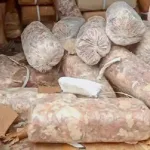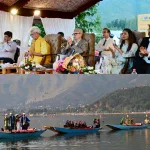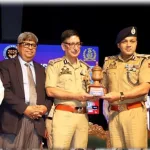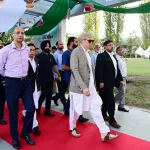Calling for a reexamination of history and a revival of India’s intellectual traditions, Lieutenant Governor Manoj Sinha on Friday urged writers to help correct historical distortions and inspire pride in the nation’s cultural and scientific legacy. Speaking at the inaugural session of the Chinar Book Festival in Srinagar, the Lt Governor described ancient India as a global hub of literature, science, and spirituality, and stressed the importance of shedding colonial narratives.
“Ancient India was the engine of world culture. The contributions we made to mathematics, medicine, and science are unparalleled,” he said. “We must tell our youth that our heritage has led the world in knowledge, and the science we gave to humanity is invaluable.”
He further underlined the cultural and intellectual resurgence taking place under Prime Minister Narendra Modi’s leadership. “India is witnessing a renaissance across economic, cultural, and scientific spheres. The role of writers and intellectuals is vital in strengthening the nation’s spiritual and social fabric,” he noted.
The three-day festival, organised by the National Book Trust of India under the Ministry of Education, aims to foster a culture of reading and literary appreciation, while showcasing India’s linguistic and philosophical diversity. The event was also graced by Union Education Minister DharmendraPradhan, who lauded the efforts to connect youth with books and knowledge systems rooted in Indian tradition.
Organised by the National Book Trust (NBT) of India in collaboration with the National Council for Promotion of Urdu Language (NCPUL) and the Srinagar district administration, the nine-day festival, running from August 2 to 10, aims to celebrate literature, promote linguistic diversity, and encourage reading habits across J&K. With over 200 publishers and booksellers from across India showcasing literature in English, Hindi, Kashmiri, Urdu, and Dogri, the event has already drawn hundreds of writers, students, readers, and cultural enthusiasts.
In his address, Lt Governor Sinha congratulated the Ministry of Education and the National Book Trust for creating a platform that encourages dialogue between readers, scholars, and authors from across the country. “Books open a window to the world. They promote critical thinking, spark new ideas, and shape how we see our surroundings,” he said. “The Chinar Book Festival will help bridge generations and preserve our traditional wisdom.”
He called upon the National Book Trust to make India’s ancient texts more accessible by publishing and translating literary works such as the NilamatPurana, Rajatarangini, and Kathasaritsagara into various Indian languages. “These should be featured prominently at international book fairs to introduce the world to Jammu & Kashmir’s unique literary heritage,” he said.
The Lt Governor also stressed the importance of promoting regional literature. He urged the Trust to support and translate works in Kashmiri, Pahari, Gojri, Dogri, Urdu, and Punjabi, so they can reach a wider audience across India and abroad.
One of the highlights of the event was the inauguration of Saradaksarani,the first national exhibition of Sharada alphabets, aimed at reviving interest in ancient scripts once prevalent in the region. Additionally, the Kashmiri translation of the book “Jammu, Kashmir and Ladakh—Through the Ages” was released, receiving praise for its contribution to local historiography.
The festival also saw the announcement of winners from the Rashtriya e-PustakalayaAmritKaal Story Writing Competition, which attracted young talent from across the country.
Dignitaries present at the occasion included Prof. MilindSudhakarMarathe, Chairman, National Book Trust; Vijay Kumar Bidhuri, Divisional Commissioner, Kashmir; Prof. RaghuvendraTanwar, Chairman, Indian Council of Historical Research (ICHR); Dr AmitWanchoo, Chief Convener of the Chinar Book Festival; and Yuvraj Malik, Director, National Book Trust.
The event attracted participation from vice chancellors, senior officials, eminent writers, academicians, students, and literature enthusiasts, who gathered in large numbers to celebrate the written word and India’s vibrant literary heritage.








